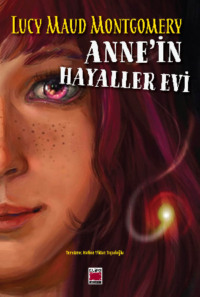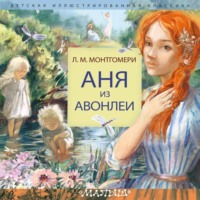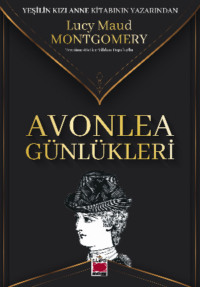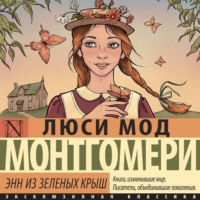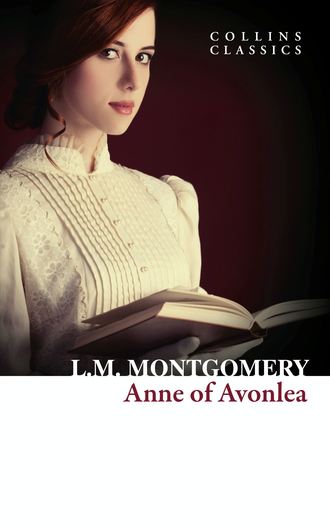
Полная версия
Anne of Avonlea
She knew Paul was ten but he looked no more than eight. He had the most beautiful little face she had ever seen in a child … features of exquisite delicacy and refinement, framed in a halo of chestnut curls. His mouth was delicious, being full without pouting, the crimson lips just softly touching and curving into finely finished little corners that narrowly escaped being dimpled. He had a sober, grave, meditative expression, as if his spirit was much older than his body; but when Anne smiled softly at him it vanished in a sudden answering smile, which seemed an illumination of his whole being, as if some lamp had suddenly kindled into flame inside of him, irradiating him from top to toe. Best of all, it was involuntary, born of no external effort or motive, but simply the outflashing of a hidden personality, rare and fine and sweet. With a quick interchange of smiles Anne and Paul were fast friends forever before a word had passed between them.
The day went by like a dream. Anne could never clearly recall it afterwards. It almost seemed as if it were not she who was teaching but somebody else. She heard classes and worked sums and set copies mechanically. The children behaved quite well; only two cases of discipline occurred. Morley Andrews was caught driving a pair of trained crickets in the aisle. Anne stood Morley on the platform for an hour and … which Morley felt much more keenly … confiscated his crickets. She put them in a box and on the way from school set them free in Violet Vale; but Morley believed, then and ever afterwards, that she took them home and kept them for her own amusement.
The other culprit was Anthony Pye, who poured the last drops of water from his slate bottle down the back of Aurelia Clay’s neck. Anne kept Anthony in at recess and talked to him about what was expected of gentlemen, admonishing him that they never poured water down ladies’ necks. She wanted all her boys to be gentlemen, she said. Her little lecture was quite kind and touching; but unfortunately Anthony remained absolutely untouched. He listened to her in silence, with the same sullen expression, and whistled scornfully as he went out. Anne sighed; and then cheered herself up by remembering that winning a Pye’s affections, like the building of Rome, wasn’t the work of a day. In fact, it was doubtful whether some of the Pyes had any affections to win; but Anne hoped better things of Anthony, who looked as if he might be a rather nice boy if one ever got behind his sullenness.
When school was dismissed and the children had gone Anne dropped wearily into her chair. Her head ached and she felt woefully discouraged. There was no real reason for discouragement, since nothing very dreadful had occurred; but Anne was very tired and inclined to believe that she would never learn to like teaching. And how terrible it would be to be doing something you didn’t like every day for … well, say forty years. Anne was of two minds whether to have her cry out then and there, or wait till she was safely in her own white room at home. Before she could decide there was a click of heels and a silken swish on the porch floor, and Anne found herself confronted by a lady whose appearance made her recall a recent criticism of Mr. Harrison’s on an overdressed female he had seen in a Charlottetown store. “She looked like a head-on collision between a fashion plate and a nightmare.”
The newcomer was gorgeously arrayed in a pale blue summer silk, puffed, frilled, and shirred wherever puff, frill, or shirring could possibly be placed. Her head was surmounted by a huge white chiffon hat, bedecked with three long but rather stringy ostrich feathers. A veil of pink chiffon, lavishly sprinkled with huge black dots, hung like a flounce from the hat brim to her shoulders and floated off in two airy streamers behind her. She wore all the jewelry that could be crowded on one small woman, and a very strong odor of perfume attended her.
“I am Mrs. Donnell … Mrs. H. B. Donnell,” announced this vision, “and I have come in to see you about something Clarice Almira told me when she came home to dinner today. It annoyed me excessively.”
“I’m sorry,” faltered Anne, vainly trying to recollect any incident of the morning connected with the Donnell children.
“Clarice Almira told me that you pronounced our name Donnell. Now, Miss Shirley, the correct pronunciation of our name is Donnell … accent on the last syllable. I hope you’ll remember this in future.”
“I’ll try to,” gasped Anne, choking back a wild desire to laugh. “I know by experience that it’s very unpleasant to have one’s name spelled wrong and I suppose it must be even worse to have it pronounced wrong.”
“Certainly it is. And Clarice Almira also informed me that you call my son Jacob.”
“He told me his name was Jacob,” protested Anne.
“I might well have expected that,” said Mrs. H. B. Donnell, in a tone which implied that gratitude in children was not to be looked for in this degenerate age. “That boy has such plebeian tastes, Miss Shirley. When he was born I wanted to call him St. Clair … it sounds SO aristocratic, doesn’t it? But his father insisted he should be called Jacob after his uncle. I yielded, because Uncle Jacob was a rich old bachelor. And what do you think, Miss Shirley? When our innocent boy was five years old Uncle Jacob actually went and got married and now he has three boys of his own. Did you ever hear of such ingratitude? The moment the invitation to the wedding … for he had the impertinence to send us an invitation, Miss Shirley … came to the house I said, ‘No more Jacobs for me, thank you.’ From that day I called my son St. Clair and St. Clair I am determined he shall be called. His father obstinately continues to call him Jacob, and the boy himself has a perfectly unaccountable preference for the vulgar name. But St. Clair he is and St. Clair he shall remain. You will kindly remember this, Miss Shirley, will you not? Thank you. I told Clarice Almira that I was sure it was only a misunderstanding and that a word would set it right. Donnell … accent on the last syllable … and St. Clair … on no account Jacob. You’ll remember? Thank you.”
When Mrs. H. B. Donnell had skimmed away Anne locked the school door and went home. At the foot of the hill she found Paul Irving by the Birch Path. He held out to her a cluster of the dainty little wild orchids which Avonlea children called “rice lillies.”
“Please, teacher, I found these in Mr. Wright’s field,” he said shyly, “and I came back to give them to you because I thought you were the kind of lady that would like them, and because …” he lifted his big beautiful eyes … “I like you, teacher.”
“You darling,” said Anne, taking the fragrant spikes. As if Paul’s words had been a spell of magic, discouragement and weariness passed from her spirit, and hope upwelled in her heart like a dancing fountain. She went through the Birch Path light-footedly, attended by the sweetness of her orchids as by a benediction.
“Well, how did you get along?” Marilla wanted to know.
“Ask me that a month later and I may be able to tell you. I can’t now … I don’t know myself … I’m too near it. My thoughts feel as if they had been all stirred up until they were thick and muddy. The only thing I feel really sure of having accomplished today is that I taught Cliffie Wright that A is A. He never knew it before. Isn’t it something to have started a soul along a path that may end in Shakespeare and Paradise Lost?”
Mrs. Lynde came up later on with more encouragement. That good lady had waylaid the schoolchildren at her gate and demanded of them how they liked their new teacher.
“And every one of them said they liked you splendid, Anne, except Anthony Pye. I must admit he didn’t. He said you ‘weren’t any good, just like all girl teachers.’ There’s the Pye leaven for you. But never mind.”
“I’m not going to mind,” said Anne quietly, “and I’m going to make Anthony Pye like me yet. Patience and kindness will surely win him.”
“Well, you can never tell about a Pye,” said Mrs. Rachel cautiously. “They go by contraries, like dreams, often as not. As for that Donnell woman, she’ll get no Donnelling from me, I can assure you. The name is Donnell and always has been. The woman is crazy, that’s what. She has a pug dog she calls Queenie and it has its meals at the table along with the family, eating off a china plate. I’d be afraid of a judgment if I was her. Thomas says Donnell himself is a sensible, hard-working man, but he hadn’t much gumption when he picked out a wife, that’s what.”
CHAPTER 6
All Sorts and Conditions of Men … and Women
A September day on Prince Edward Island hills; a crisp wind blowing up over the sand dunes from the sea; a long red road, winding through fields and woods, now looping itself about a corner of thick set spruces, now threading a plantation of young maples with great feathery sheets of ferns beneath them, now dipping down into a hollow where a brook flashed out of the woods and into them again, now basking in open sunshine between ribbons of golden-rod and smoke-blue asters; air athrill with the pipings of myriads of crickets, those glad little pensioners of the summer hills; a plump brown pony ambling along the road; two girls behind him, full to the lips with the simple, priceless joy of youth and life.
“Oh, this is a day left over from Eden, isn’t it, Diana?” … and Anne sighed for sheer happiness. “The air has magic in it. Look at the purple in the cup of the harvest valley, Diana. And oh, do smell the dying fir! It’s coming up from that little sunny hollow where Mr. Eben Wright has been cutting fence poles. Bliss is it on such a day to be alive; but to smell dying fir is very heaven. That’s two thirds Wordsworth and one third Anne Shirley. It doesn’t seem possible that there should be dying fir in heaven, does it? And yet it doesn’t seem to me that heaven would be quite perfect if you couldn’t get a whiff of dead fir as you went through its woods. Perhaps we’ll have the odor there without the death. Yes, I think that will be the way. That delicious aroma must be the souls of the firs … and of course it will be just souls in heaven.”
“Trees haven’t souls,” said practical Diana, “but the smell of dead fir is certainly lovely. I’m going to make a cushion and fill it with fir needles. You’d better make one too, Anne.”
“I think I shall … and use it for my naps. I’d be certain to dream I was a dryad or a woodnymph then. But just this minute I’m well content to be Anne Shirley, Avonlea schoolma’am, driving over a road like this on such a sweet, friendly day.”
“It’s a lovely day but we have anything but a lovely task before us,” sighed Diana. “Why on earth did you offer to canvass this road, Anne? Almost all the cranks in Avonlea live along it, and we’ll probably be treated as if we were begging for ourselves. It’s the very worst road of all.”
“That is why I chose it. Of course Gilbert and Fred would have taken this road if we had asked them. But you see, Diana, I feel myself responsible for the AVIS, since I was the first to suggest it, and it seems to me that I ought to do the most disagreeable things. I’m sorry on your account; but you needn’t say a word at the cranky places. I’ll do all the talking … Mrs. Lynde would say I was well able to. Mrs. Lynde doesn’t know whether to approve of our enterprise or not. She inclines to, when she remembers that Mr. and Mrs. Allan are in favor of it; but the fact that village improvement societies first originated in the States is a count against it. So she is halting between two opinions and only success will justify us in Mrs. Lynde’s eyes. Priscilla is going to write a paper for our next Improvement meeting, and I expect it will be good, for her aunt is such a clever writer and no doubt it runs in the family. I shall never forget the thrill it gave me when I found out that Mrs. Charlotte E. Morgan was Priscilla’s aunt. It seemed so wonderful that I was a friend of the girl whose aunt wrote Edgewood Days and The Rosebud Garden.”
“Where does Mrs. Morgan live?”
“In Toronto. And Priscilla says she is coming to the Island for a visit next summer, and if it is possible Priscilla is going to arrange to have us meet her. That seems almost too good to be true—but it’s something pleasant to imagine after you go to bed.”
The Avonlea Village Improvement Society was an organized fact. Gilbert Blythe was president, Fred Wright vice-president, Anne Shirley secretary, and Diana Barry treasurer. The “Improvers,” as they were promptly christened, were to meet once a fortnight at the homes of the members. It was admitted that they could not expect to affect many improvements so late in the season; but they meant to plan the next summer’s campaign, collect and discuss ideas, write and read papers, and, as Anne said, educate the public sentiment generally.
There was some disapproval, of course, and … which the Improvers felt much more keenly … a good deal of ridicule. Mr. Elisha Wright was reported to have said that a more appropriate name for the organization would be Courting Club. Mrs. Hiram Sloane declared she had heard the Improvers meant to plough up all the roadsides and set them out with geraniums. Mr. Levi Boulter warned his neighbors that the Improvers would insist that everybody pull down his house and rebuild it after plans approved by the society. Mr. James Spencer sent them word that he wished they would kindly shovel down the church hill. Eben Wright told Anne that he wished the Improvers could induce old Josiah Sloane to keep his whiskers trimmed. Mr. Lawrence Bell said he would whitewash his barns if nothing else would please them but he would not hang lace curtains in the cowstable windows. Mr. Major Spencer asked Clifton Sloane, an Improver who drove the milk to the Carmody cheese factory, if it was true that everybody would have to have his milk-stand hand-painted next summer and keep an embroidered centerpiece on it.
In spite of … or perhaps, human nature being what it is, because of … this, the Society went gamely to work at the only improvement they could hope to bring about that fall. At the second meeting, in the Barry parlor, Oliver Sloane moved that they start a subscription to re-shingle and paint the hall; Julia Bell seconded it, with an uneasy feeling that she was doing something not exactly ladylike. Gilbert put the motion, it was carried unanimously, and Anne gravely recorded it in her minutes. The next thing was to appoint a committee, and Gertie Pye, determined not to let Julia Bell carry off all the laurels, boldly moved that Miss Jane Andrews be chairman of said committee. This motion being also duly seconded and carried, Jane returned the compliment by appointing Gertie on the committee, along with Gilbert, Anne, Diana, and Fred Wright. The committee chose their routes in private conclave. Anne and Diana were told off for the Newbridge road, Gilbert and Fred for the White Sands road, and Jane and Gertie for the Carmody road.
“Because,” explained Gilbert to Anne, as they walked home together through the Haunted Wood, “the Pyes all live along that road and they won’t give a cent unless one of themselves canvasses them.”
The next Saturday Anne and Diana started out. They drove to the end of the road and canvassed homeward, calling first on the “Andrew girls.”
“If Catherine is alone we may get something,” said Diana, “but if Eliza is there we won’t.”
Eliza was there … very much so … and looked even grimmer than usual. Miss Eliza was one of those people who give you the impression that life is indeed a vale of tears, and that a smile, never to speak of a laugh, is a waste of nervous energy truly reprehensible. The Andrew girls had been “girls” for fifty odd years and seemed likely to remain girls to the end of their earthly pilgrimage. Catherine, it was said, had not entirely given up hope, but Eliza, who was born a pessimist, had never had any. They lived in a little brown house built in a sunny corner scooped out of Mark Andrew’s beech woods. Eliza complained that it was terrible hot in summer, but Catherine was wont to say it was lovely and warm in winter.
Eliza was sewing patchwork, not because it was needed but simply as a protest against the frivolous lace Catherine was crocheting. Eliza listened with a frown and Catherine with a smile, as the girls explained their errand. To be sure, whenever Catherine caught Eliza’s eye she discarded the smile in guilty confusion; but it crept back the next moment.
“If I had money to waste,” said Eliza grimly, “I’d burn it up and have the fun of seeing a blaze maybe; but I wouldn’t give it to that hall, not a cent. It’s no benefit to the settlement … just a place for young folks to meet and carry on when they’s better be home in their beds.”
“Oh, Eliza, young folks must have some amusement,” protested Catherine.
“I don’t see the necessity. We didn’t gad about to halls and places when we were young, Catherine Andrews. This world is getting worse every day.”
“I think it’s getting better,” said Catherine firmly.
“You think!” Miss Eliza’s voice expressed the utmost contempt. “It doesn’t signify what you think, Catherine Andrews. Facts is facts.”
“Well, I always like to look on the bright side, Eliza.”
“There isn’t any bright side.”
“Oh, indeed there is,” cried Anne, who couldn’t endure such heresy in silence. “Why, there are ever so many bright sides, Miss Andrews. It’s really a beautiful world.”
“You won’t have such a high opinion of it when you’ve lived as long in it as I have,” retorted Miss Eliza sourly, “and you won’t be so enthusiastic about improving it either. How is your mother, Diana? Dear me, but she has failed of late. She looks terrible run down. And how long is it before Marilla expects to be stone blind, Anne?”
“The doctor thinks her eyes will not get any worse if she is very careful,” faltered Anne.
Eliza shook her head.
“Doctors always talk like that just to keep people cheered up. I wouldn’t have much hope if I was her. It’s best to be prepared for the worst.”
“But oughtn’t we be prepared for the best too?” pleaded Anne. “It’s just as likely to happen as the worst.”
“Not in my experience, and I’ve fifty-seven years to set against your sixteen,” retorted Eliza. “Going, are you? Well, I hope this new society of yours will be able to keep Avonlea from running any further down hill but I haven’t much hope of it.”
Anne and Diana got themselves thankfully out, and drove away as fast as the fat pony could go. As they rounded the curve below the beech wood a plump figure came speeding over Mr. Andrews’ pasture, waving to them excitedly. It was Catherine Andrews and she was so out of breath that she could hardly speak, but she thrust a couple of quarters into Anne’s hand.
“That’s my contribution to painting the hall,” she gasped. “I’d like to give you a dollar but I don’t dare take more from my egg money for Eliza would find it out if I did. I’m real interested in your society and I believe you’re going to do a lot of good. I’m an optimist. I have to be, living with Eliza. I must hurry back before she misses me … she thinks I’m feeding the hens. I hope you’ll have good luck canvassing, and don’t be cast down over what Eliza said. The world is getting better … it certainly is.”
The next house was Daniel Blair’s.
“Now, it all depends on whether his wife is home or not,” said Diana, as they jolted along a deep-rutted lane. “If she is we won’t get a cent. Everybody says Dan Blair doesn’t dare have his hair cut without asking her permission; and it’s certain she’s very close, to state it moderately. She says she has to be just before she’s generous. But Mrs. Lynde says she’s so much ‘before’ that generosity never catches up with her at all.”
Anne related their experience at the Blair place to Marilla that evening.
“We tied the horse and then rapped at the kitchen door. Nobody came but the door was open and we could hear somebody in the pantry, going on dreadfully. We couldn’t make out the words but Diana says she knows they were swearing by the sound of them. I can’t believe that of Mr. Blair, for he is always so quiet and meek; but at least he had great provocation, for Marilla, when that poor man came to the door, red as a beet, with perspiration streaming down his face, he had on one of his wife’s big gingham aprons. ‘I can’t get this durned thing off,’ he said, ‘for the strings are tied in a hard knot and I can’t bust ‘em, so you’ll have to excuse me, ladies.’ We begged him not to mention it and went in and sat down. Mr. Blair sat down too; he twisted the apron around to his back and rolled it up, but he did look so ashamed and worried that I felt sorry for him, and Diana said she feared we had called at an inconvenient time. ‘Oh, not at all,’ said Mr. Blair, trying to smile … you know he is always very polite … ‘I’m a little busy … getting ready to bake a cake as it were. My wife got a telegram today that her sister from Montreal is coming tonight and she’s gone to the train to meet her and left orders for me to make a cake for tea. She writ out the recipe and told me what to do but I’ve clean forgot half the directions already. And it says, ‘flavor according to taste.’ What does that mean? How can you tell? And what if my taste doesn’t happen to be other people’s taste? Would a tablespoon of vanilla be enough for a small layer cake?”
“I felt sorrier than ever for the poor man. He didn’t seem to be in his proper sphere at all. I had heard of henpecked husbands and now I felt that I saw one. It was on my lips to say, ‘Mr. Blair, if you’ll give us a subscription for the hall I’ll mix up your cake for you.’ But I suddenly thought it wouldn’t be neighborly to drive too sharp a bargain with a fellow creature in distress. So I offered to mix the cake for him without any conditions at all. He just jumped at my offer. He said he’d been used to making his own bread before he was married but he feared cake was beyond him, and yet he hated to disappoint his wife. He got me another apron, and Diana beat the eggs and I mixed the cake. Mr. Blair ran about and got us the materials. He had forgotten all about his apron and when he ran it streamed out behind him and Diana said she thought she would die to see it. He said he could bake the cake all right … he was used to that … and then he asked for our list and he put down four dollars. So you see we were rewarded. But even if he hadn’t given a cent I’d always feel that we had done a truly Christian act in helping him.”
Theodore White’s was the next stopping place. Neither Anne nor Diana had ever been there before, and they had only a very slight acquaintance with Mrs. Theodore, who was not given to hospitality. Should they go to the back or front door? While they held a whispered consultation Mrs. Theodore appeared at the front door with an armful of newspapers. Deliberately she laid them down one by one on the porch floor and the porch steps, and then down the path to the very feet of her mystified callers.
“Will you please wipe your feet carefully on the grass and then walk on these papers?” she said anxiously. “I’ve just swept the house all over and I can’t have any more dust tracked in. The path’s been real muddy since the rain yesterday.”
“Don’t you dare laugh,” warned Anne in a whisper, as they marched along the newspapers. “And I implore you, Diana, not to look at me, no matter what she says, or I shall not be able to keep a sober face.”
The papers extended across the hall and into a prim, fleckless parlor. Anne and Diana sat down gingerly on the nearest chairs and explained their errand. Mrs. White heard them politely, interrupting only twice, once to chase out an adventurous fly, and once to pick up a tiny wisp of grass that had fallen on the carpet from Anne’s dress. Anne felt wretchedly guilty; but Mrs. White subscribed two dollars and paid the money down … “to prevent us from having to go back for it,” Diana said when they got away. Mrs. White had the newspapers gathered up before they had their horse untied and as they drove out of the yard they saw her busily wielding a broom in the hall.


